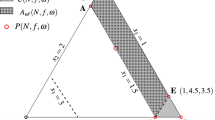Summary.
This paper studies the conditions for aggregation, portfolio separation and effective completeness of competitive allocations in general equilibrium models with incomplete markets where agents have general preference and endowment distributions. We show that these properties are distinct. Demands may aggregate yet may fail to exhibit fund separation and conversely. Fund separation implies effective completeness while aggregation does not. The implications of these properties for the structure of equilibria are discussed, and generalizations of the CAPM, the consumption CAPM and the CAPM with nonmarketed wealth emerge from the analysis.
Similar content being viewed by others
Author information
Authors and Affiliations
Additional information
Received: September 12, 1996; revised version: November 7, 1996
Rights and permissions
About this article
Cite this article
Detemple, J., Gottardi, P. Aggregation, efficiency and mutual fund separation in incomplete markets. Economic Theory 11, 443–455 (1998). https://doi.org/10.1007/s001990050196
Issue Date:
DOI: https://doi.org/10.1007/s001990050196




